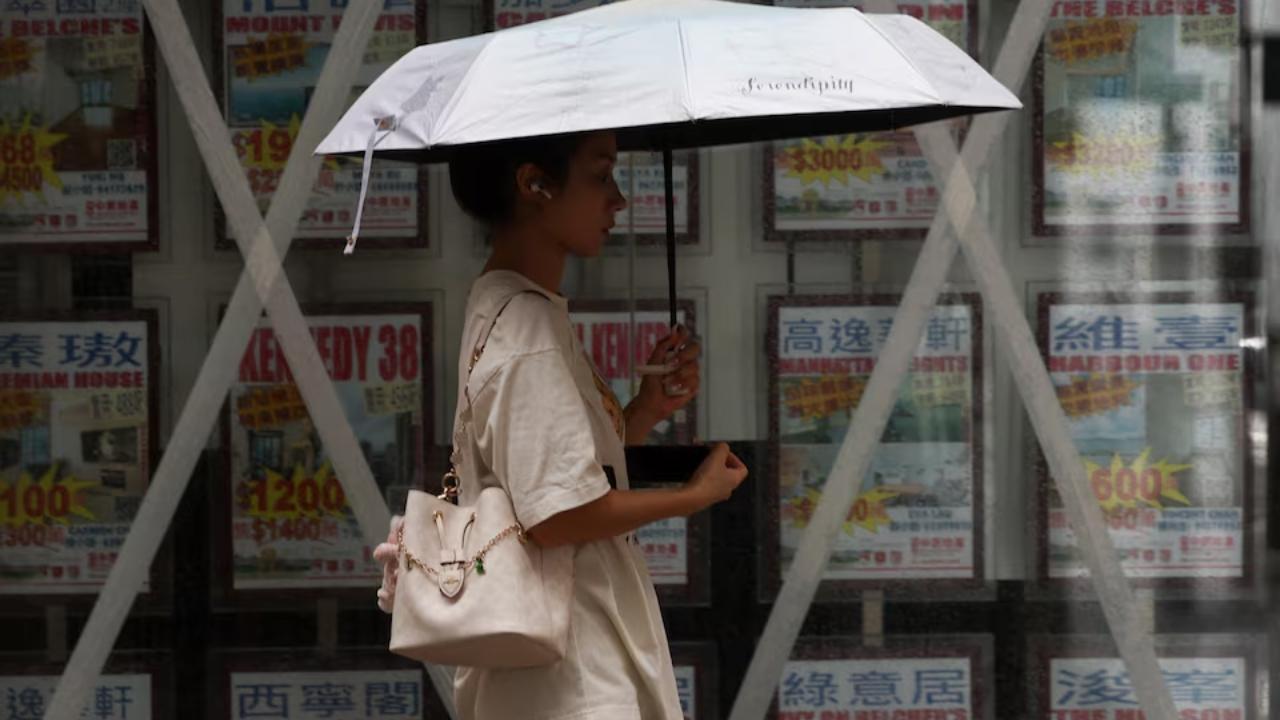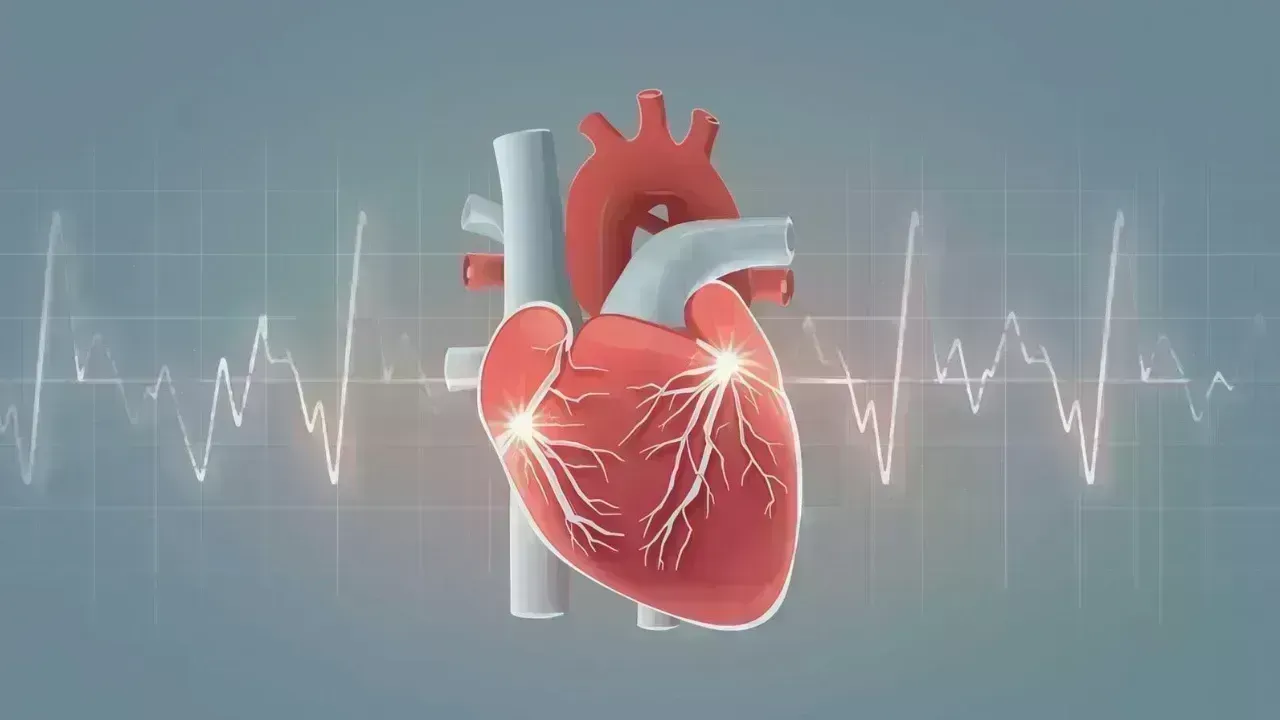
Post by : Monika
Photo: Reuters
Early in the morning on September 8, 2025, Tropical Storm Tapah moved close to Hong Kong, forcing the city to take serious safety steps. As dark clouds gathered and winds picked up, the Hong Kong Observatory, which monitors the weather, put out a Typhoon No. 8 warning signal.
This warning told everyone that the storm was strong enough to make traveling and working dangerous. The warning system helps people prepare for severe weather and reminds them to stay indoors.
Hong Kong’s government reacted quickly to keep people safe. All schools were shut down, and students stayed home. Many businesses also closed their doors, letting workers either take the day off or work from home.
On the roads, many public transport services like ferries, buses, and street trams stopped running because of the threat from the winds. City trains did run but faced delays and confusion as more people tried to use them for safe travel.
Flights at the airport were also affected. Over 100 flights had to be canceled, and some planes were delayed for hours. Travelers waiting at the airport ended up sleeping on chairs or on the floor, unsure of when they’d be able to go home or reach their destinations. Amid all this, there was a report of one plane landing unexpectedly on the grass, but nobody was hurt, and it was not clear if Tapah’s wind and rain were the reason.
How Strong Were Tapah’s Winds and Rain?
The core of the storm stayed about 170 kilometers away from the city, but it was still strong enough to make life difficult locally. Gusts of wind near the Hong Kong International Airport hit as high as 151 kilometers per hour. That’s strong enough to move objects, break tree branches, and sometimes even knock down weaker trees.
Tapah also brought bursts of heavy rain. On the morning of September 8, the city’s weather department issued an Amber rainstorm warning, telling everyone to be careful of possible flooding, slippery roads, and rising water levels. Many people watched weather updates from their homes, hoping the storm would move away quickly.
Why Were Schools and Transport Services Shut?
The government’s main goal was to keep children and workers from getting hurt. Most accidents during storms happen when people go out travelling or try to go to work or school as usual. By closing all schools and stopping many transport services, Hong Kong’s leaders wanted everyone to avoid dangerous roads, flooded streets, or falling branches.
For parents and students, it was a sudden break from school. Teachers sent messages that classes would be canceled for the day. Some students logged onto their computers for online lessons, but most waited for news about when they could go back in person.
Office workers found themselves at home, many following updates from their bosses. The few businesses that did open were mostly those that provided important services like food and medicine. Local stores and restaurants were shut, and people avoided going out unless it was necessary.
Reported Damage and Injuries
While Tapah was a strong storm, Hong Kong escaped any extreme destruction. There were some reports of trees falling and small floods in low-lying places, but emergency teams cleaned up quickly. No buildings collapsed, and there were no landslides or large floods. Most people stayed inside as instructed, helping keep dangerous accidents from happening.
A total of twelve people suffered injuries during the storm, mostly from slips, falls, or being hit by small flying debris. Most of these were minor and treated by doctors at local clinics or hospitals. Ambulances were on standby, but thanks to the government’s warnings and people’s careful behavior, the city avoided a bigger disaster.
In nearby cities like Shenzhen, schools and businesses were also closed for the day. Mainland China took even bigger safety measures, ordering that around 60,000 people living close to the sea should move to safe areas. Tourist places and attractions along the coast were shut so travelers wouldn’t get trapped or harmed.
The Calm After the Storm
When the Typhoon No. 8 signal stayed in place until late in the morning, the city was quiet. Normally busy streets were empty except for a few cars moving slowly and emergency trucks helping out. News reports showed pictures of empty playgrounds, closed shops, and shut office towers. Most people stayed home, watching television or using phones to check for any new updates.
As Tapah moved further away, the weather started to improve. The skies brightened up, and winds became less fierce. Hong Kong’s weather office eventually lowered the warning signal later in the day, letting people know it was safer to go outside.
City teams, including police and cleaners, quickly got to work, clearing any fallen trees and making sure roads were safe again. Train and bus services started running normally, and flights at the airport slowly resumed. By the afternoon, life was returning step by step to normal.
Returning to Normal Life After Tapah
For most Hong Kong families, the first thing was to check if their homes and neighborhoods were safe. Many people called friends and relatives to make sure everyone was OK. Parents looked after their children, and neighbors talked to each other, sharing news and advice.
Shops and markets opened again, and people went out to buy food and other things they needed. Students and teachers prepared to go back to school the next day, and office workers got ready to return as well.
Repair workers fixed small problems fast, like broken windows or fallen signs. The government checked that all important services, such as water and electricity, were working and sent help where there were still problems.
Some families and travelers who were stuck at the airport got new flights and finally reached their destinations. Businesses ran like usual, and Hong Kong’s daily life continued. Television and radio stations gave out safety tips and reminders so that everyone would be prepared if another storm came in the future.
Lessons from Tapah
Tropical Storm Tapah showed Hong Kong’s strong system for dealing with bad weather. Thanks to early warnings and strict rules, the city avoided bigger dangers. People listened to advice, stayed inside, and helped one another. Safety was the most important thing.
Local experts reminded people that Hong Kong faces storms almost every year. It’s important to have emergency plans, know how to find information, and follow instructions when the weather gets dangerous. Schools, offices, and families prepared well, making sure everyone was protected.
Why Storms Like Tapah Matter
Storms like Tapah are reminders that nature can be strong and unpredictable. Hong Kong is known for its tall buildings and busy life, but when a storm comes, everything slows down to make sure people aren't hurt. By working together, listening to warnings, and staying calm, a city can handle disasters and quickly return to normal.
Kids, workers, and older people all play a part in keeping their families and communities safe. Each time a city faces a storm and recovers quickly, it helps everyone learn how to deal with the next one.
Tropical Storm Tapah was powerful and brought heavy winds and rain to Hong Kong, but careful planning and quick actions helped keep the city safe. Schools and businesses closed, transport stopped, and people stayed home. The damage was light and only a few people got minor injuries. Life in Hong Kong returned to normal quickly after the storm passed. This event shows the importance of teamwork, listening to advice, and keeping safety first during harsh weather.










NBA Friday Recap: Powerhouse Wins for Miami, LA, Milwaukee, and Clippers
Miami, LA Lakers, Milwaukee, and Clippers triumphed in a thrilling NBA Friday, showcasing standout p

Doncic Shines with 49 Points in Lakers' 128-110 Victory over Timberwolves
Luka Doncic dazzles with 49 points as the Lakers secure a 128-110 win against the Timberwolves, show

Kings Triumph Over Jazz 105-104 with Last-Minute Sabonis Effort
The Sacramento Kings edged out the Utah Jazz 105-104, with Domantas Sabonis making the decisive shot

Argentina's Friendly Match Against India Delayed, New Date to be Announced
The friendly match between Argentina and India in Kochi has been postponed due to FIFA approval dela

Rohit and Kohli Conclude ODI Journeys in Australia with a Victory
Rohit Sharma and Virat Kohli bid adieu to Australian ODIs with a final win, forming a 168-run partne

George Russell's Wrestling Mask Antics at Mexican Grand Prix
George Russell donned a wrestling mask to enjoy the Mexican Grand Prix from the stands, providing a